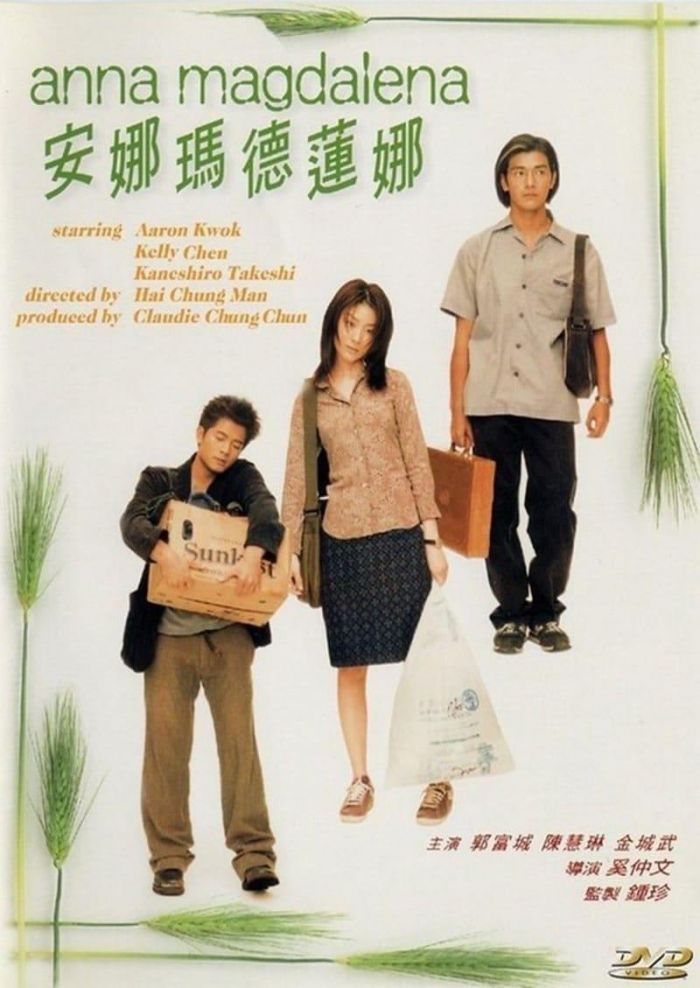Anna Magdalena by Chung Man Yee (Review)

The “romantic triangle” is not an especially novel concept in movies. Two guys fall for the same girl. Friendships disintegrate. Hearts are broken. The guy everyone’s rooting for gets screwed, while the total jerk gets the girl. I don’t know about you, but that sounds like my high school experience all over again. And I don’t think I’m along in that… so I guess I can’t blame the people behind Anna Magdalena for trying to throw in something new to liven up the formula. If I were in their shoes, I probably would’ve done the same thing. But I hope I’d have the sense to refrain from undermining the whole picture at the same time.
Anna Magdalena starts off conventionally enough. Chan (Kaneshiro) and Yau (Kwok) are complete opposites. Chan is a decent, hardworking guy who doesn’t have much luck with the ladies. Yau is the type that could have any girl he wants, and yet couldn’t care less if he breaks their hearts. In fact, when the two meet, Yau is in the process of ditching a gal. But through a series of events, mainly revolving around Yau’s irresponsibility, they become roommates and friends.
But things get complicated the day Mok (Chen) moves into their apartment building. Chan is immediately smitten with her (not that I blame him — it is Kelly Chen after all) but he’s too nervous to talk to her. And it doesn’t help that she holds the two friends in no small amount of contempt. And it really doesn’t help matters when Yau takes an immediate disliking to Mok and her constant (and poor) piano playing. But soon enough, Chan finds himself the odd man out as Yau and Mok inexplicably begin growing closer after Mok’s apartment catches on fire.
Told in a series of movements that introduce the characters and develop their relationships, Anna Magdalena is certainly charming enough, if not a little pedestrian, for the first three-fourths or so. There’s nothing revolutionary going on, and there’s certainly no great amount of gripping drama. But as the film progresses, you start to feel for Chan, to really hope he gets his act in gear before he loses any chance with Mok. And the movie’s use of Bach’s “Notebook For Anna Magdalena” as a haunting parallel of Chan’s feelings lends it a certain poignancy.
Eventually, Mok comes face to face with Yau’s womanizing ways, but she still can’t shut him out completely. Even though she turns him away, they eventually end up in each other’s arms again and, in what might be the movie’s most moving scene, finally shut out Chan. That’s when Chan finally makes his move, and that’s where the movie just, well, gets weird. Unable to confront Mok personally, he writes a story about his desire and gets it published. But rather than just tell us, director Chung-Man Hai decides to show us Chan’s story in the movie’s 4th and final movement.
Told in a dreamlike sequence that plays like bad children’s fantasy, two adventurers named Cross (Chen) and Zero (Kaneshiro) embark on an adventure to fulfill a ghost’s long lost love. When they are unable to fulfill their mission, Cross and Zero decide to do the next best thing (or so they think). They start a company that will help others express their love when they can’t, a sort of singing valentine service. And it’s as bad as you can imagine.
While I was interested, and even attached, to the movie, the moment I saw Cross and Zero launch into a horrible lovesong I just wanted it to end. I wanted to go back to the movie I had been watching. Yes, Anna Magdalena is about unrequited love, but I don’t need song and dance numbers and a subpar adventure story to reinforce that.
This little story within a story concept is novel, but it’s something Anna Magdalena never recovers from. Whereas the first three-fourths had developed slowly, the fantasy sequence is all madcap and mayhem. It’s over the top and rambunctious, and throws everything that comes afterwards completely off-balance, and undoes everything that occurred beforehand.
Furthermore, a new character (the editor that puts out Chan’s novel) is introduced, complicating things moreso. She just hovers on the movie’s periphery, and you’re never sure if you should keep waiting for her proper introduction. And Yau drops completely out of view, only to suddenly reappear in the last 10 minutes or so, tie up all of the loose ends, and bring about the hollow, contrived ending.
When I first saw the sub-story coming, I thought it would be an interesting look at Chan’s unexpressed desire. I was even looking forward to it. While I liked the first 3 movements, I was unsure how the movie would resolve itself. I felt like this might be an interesting way to brings things to a close. But as it went on and on and on, I realized that I made a big mistake.
I suppose it might come across that I don’t like romantic movies, but that’s a bit of a misnomer. What I don’t like are the treacly, manipulative pieces of drivel that are normally associated with the genre. If I’m going to feel for the characters, I want it to be because they’re genuinely likable, and not because the movie tries to make me.
Ultimately, “romantic” movies rest on their characters. Their interactions, hopes, and heartaches, and the success with which they can make the viewer identify with those things, is what drives these movies. But rather than trust in these things, Anna Magdalena would rather place its faith in gimmicks.
